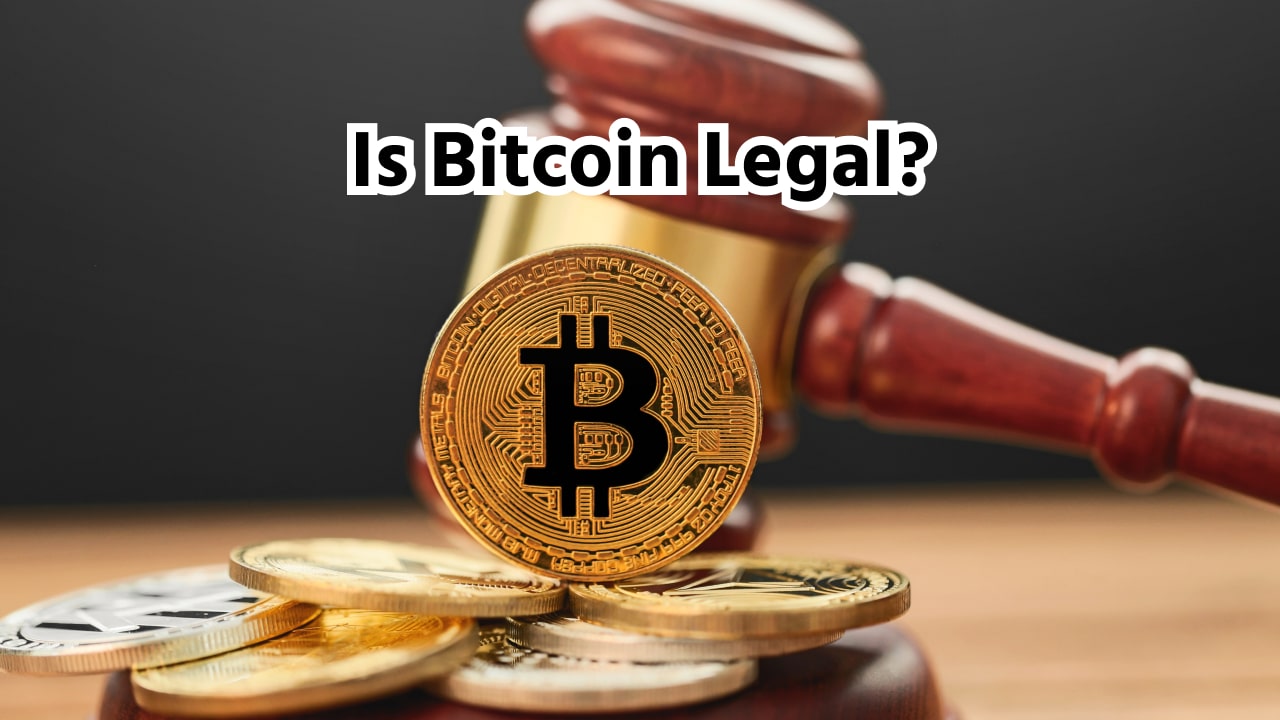The Legal Status of Bitcoin

In today’s world of finance, there’s a question that keeps popping up; Is Bitcoin legal? This digital money, which fascinates some and makes others sceptical, is at the centre of discussions on crypto regulation.
As different governments try to figure out how to handle currencies the legal status of Bitcoin becomes a point of debate. Let’s dive into this mystery and uncover the web of rules and regulations that determine whether is Bitcoin legal in parts of the world.

Is Bitcoin Legal?
The status of Bitcoin under the law varies greatly from one place to another reflecting the ways governments around the world are dealing with regulations. Here’s a closer look at whether is Bitcoin legal in countries:
India:
In India, it’s still unclear whether is Bitcoin legal and fully accepted by law. The Reserve Bank of India (RBI) has raised concerns about risks linked to cryptocurrencies. Has issued several warnings advising people against using them.
While there isn’t a ban on Bitcoin use the Indian government has put forward proposals for laws that could potentially control or even ban using and trading cryptocurrencies.
Australia:
On the hand in Australia, Bitcoin is recognized as legal. Falls under regulation, by the Australian Securities and Investments Commission (ASIC).
The nation has welcomed cryptocurrencies acknowledging them as assets. Authorities in Australia have established systems to oversee and govern cryptocurrency exchanges, guaranteeing adherence to money laundering (AML) and counter terrorism financing (CTF) regulations.
United States:
In the United States the legal status of Bitcoin varies across states with some states implementing structures while others take a more cautious stance.
The Internal Revenue Service (IRS) classifies Bitcoin as property for tax purposes making it subject to capital gains tax upon disposal or exchange for goods and services.
China:
China has imposed regulations on Bitcoin and other cryptocurrencies by prohibiting coin offerings (ICOs) and cryptocurrency exchanges.
While individuals can still possess Bitcoin, the Chinese government heavily restricts its utilization in transactions and investment activities.
Why Is The Legal Status Of Cryptocurrencies Important?
Determining on whether is Bitcoin legal is crucial for parties involved. Investors seek clarity on the status of Bitcoin to ensure compliance with laws and regulations protecting their investments from issues. Businesses rely on the legality of Bitcoin to assess its suitability for use as a payment method reducing uncertainties and risks.
Governments analyze the legal status of Bitcoin to establish regulations that balance innovation, consumer protection and financial stability. This understanding assists investors, businesses and governments in navigating the landscape, fostering growth and facilitating the seamless integration of Bitcoin into traditional finance.
Why Are Countries Banning Crypto?
- Economic Impact: Governments worry that widespread cryptocurrency adoption might disrupt systems affecting national economies and monetary policies.
- Lack Of Regulation: The lack of strong regulations raises worries about investor safety, market integrity and systemic risks in the financial sector.
- Criminal Potential: The anonymity of cryptocurrencies attracts illegal activities like money laundering and cybercrime, leading authorities to crack down on their use.
- Policy Challenges: Policymakers struggle to create rules that balance innovation with consumer protection due to the decentralized nature of cryptocurrencies.
- Tax Evation: Cryptocurrencies anonymity could facilitate tax evasion hindering government tax collection efforts and anti financial crime measures.
- Market Volatility: The uncertain nature and fluctuating prices of cryptocurrencies have sparked worries about safeguarding investors and maintaining market stability leading to actions in regions.

Is Bitcoin Recognized As Official Currency?
The official recognition of whether is Bitcoin legal and as a currency varies by location remains a topic of discussion. Here’s a summary:
India:
Bitcoin is not officially acknowledged as a currency in India. The Reserve Bank of India (RBI) has cautioned against the use of cryptocurrencies due to concerns regarding stability and security risks.
Australia:
Bitcoin is not classified as tender in Australia but is accepted as a form of payment. The Australian Taxation Office (ATO) treats Bitcoin as property for tax purposes subject to capital gains tax.
United States:
At the level in the United States Bitcoin is not regarded as tender; instead it is categorized as a decentralized virtual currency. The Internal Revenue Service (IRS) considers property for taxation.
Japan:
In Japan, Bitcoin is recognized as a means of payment. In 2017 the country enacted legislation acknowledging cryptocurrencies as tender and overseeing cryptocurrency exchanges.
In 2021 El Salvador grabbed headlines by being the country to officially accept Bitcoin as tender, passing a law that acknowledges Bitcoin as a legitimate currency, alongside the U.S. Dollar. On the hand the European Union does not formally recognize Bitcoin as a currency. Does not prohibit its use either. The European Central Bank views Bitcoin more as a high risk asset than a standard currency. In contrast, China does not consider Bitcoin as tender. Has implemented strict regulations on cryptocurrency trading and mining activities, including banning initial coin offerings (ICOs) and cryptocurrency exchanges.
Bitcoin Taxes
In countries tax regulations on transactions vary. With the rising popularity of Bitcoin, governments are putting effort into establishing tax rules to promote compliance and tackle tax evasion linked to cryptocurrency transactions. It’s important for investors and traders to grasp the tax consequences of their activities in order to fulfill their tax obligations and steer clear of penalties for noncompliance.

Is Bitcoin Secure?
Bitcoin security is maintained through features such, as technology, decentralization, encryption and private key ownership. While no system can be completely impervious to security risks Bitcoin has proven to be resilient against attacks. It continuously improves its security measures over time. By being cautious about if is bitcoin legal and following recommended security practices to protect their assets users can rely on the cryptocurrency’s dependability for transactions and investments.
When it comes to the legality of Bitcoin, understanding its position in the landscape is crucial. As mentioned earlier the legal status of Bitcoin varies across regions—some countries accept it as tender while others introduce regulatory uncertainties or outright bans. Despite these differences Bitcoin thrives as a currency driven by technology and consensus mechanisms. To navigate this landscape effectively investors, businesses and governments must comply with existing laws while harnessing the potential of this financial tool.
As regulations in this realm continue to develop, establishing frameworks will play a role in building trust encouraging innovation and promoting the adoption of cryptocurrencies like Bitcoin, in the future.
FAQ
-
Is Bitcoin legal?
The legality of Bitcoin varies depending on the jurisdiction. While some countries recognize it as legal tender or a legitimate form of payment, others impose restrictions or outright bans on its use.
-
Is it possible to treat Bitcoin like actual currency?
Bitcoin operates as a decentralized digital currency and can be used for transactions similar to traditional currencies. However, its legal status and acceptance as a medium of exchange vary, affecting its treatment as actual currency.
-
Is Bitcoin acceptable for lawful transactions?
In jurisdictions where Bitcoin is legal, it can be used for lawful transactions such as purchasing goods and services. However, its acceptance may be limited by factors such as regulatory uncertainty or the preferences of merchants.
-
What methods do governments employ to oversee Bitcoin?
Governments employ various methods to oversee Bitcoin, including regulatory frameworks, monitoring of cryptocurrency exchanges, enforcement of anti-money laundering (AML) and know your customer (KYC) regulations, and public statements or advisories regarding its use.
-
Do specific regulations exist for Bitcoin?
Many countries have implemented specific regulations for Bitcoin and other cryptocurrencies, which may include licensing requirements for exchanges, consumer protection measures, and taxation rules for cryptocurrency transactions.
-
Do taxes apply to profits earned from Bitcoin?
Taxes typically apply to profits earned from Bitcoin transactions, similar to other forms of investment income. Depending on the jurisdiction, capital gains tax or other tax regulations may apply to profits realized from buying, selling, or trading Bitcoin. It’s essential for individuals to understand and comply with tax laws related to cryptocurrency transactions in their country.
